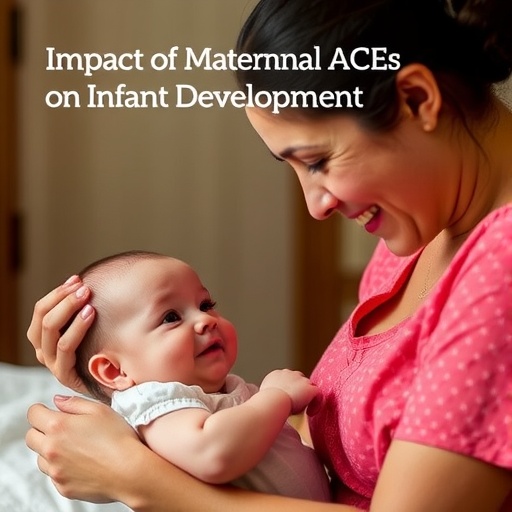Recent research has illuminated the profound effects of maternal adverse childhood experiences (ACEs) on infant developmental outcomes, particularly during the crucial first year of life. A study published in the Journal of Child and Adolescent Trauma by a team led by Zheng et al. explores the interconnectedness of maternal experiences, resilience, paternal social health, and their collective influence on the achievement of developmental milestones in infants.
Adverse childhood experiences encompass a range of traumatic incidents that can shape an individual’s emotional and psychological framework. These experiences often result from situations such as abuse, neglect, or familial instability, each of which poses long-term implications for mental health. Children of mothers who encountered significant psychosocial stressors may exhibit alterations in their developmental trajectories, as maternal mental health is intrinsically linked to the nurturing environment provided to their infants.
Resilience is frequently touted as a protective factor that can mitigate the negative impacts of ACEs. The study delves into how resilience manifests among mothers who have endured hardship, accentuating the potential for recovery and stabilization in their lives which can in turn foster a nurturing and enriched environment for their infants. This flip side of adversity points to the human capacity to overcome and thrive despite an adverse past, framing resilience as not simply a trait but as a dynamic process influenced by both context and supportive relationships.
Paternal involvement is another significant element in the developmental equation. The research highlights how paternal social health—referring to the father’s emotional well-being and social support networks—affects infant milestone achievements. It underscores the vital role fathers play in complementing maternal caregiving, especially in contexts where mothers may be experiencing their own past traumas. This paternal influence can enhance the overall development of the child, as supportive partnerships between parents yield synergistic benefits for caregiving, emotional security, and cognitive growth.
Furthermore, the study engages with the concept of “developmental milestones,” which serve as benchmarks that indicate a child’s growth and maturation across various domains, including physical, social, emotional, and cognitive skills. When maternal ACEs are present, researchers have observed a concerning correlation with delays in these milestones. This raises critical questions regarding early intervention strategies and the importance of support systems for at-risk mothers and their infants.
The interplay of these factors suggests that mitigating the effects of maternal ACEs could lead to significant improvements in infant development, emphasizing the need for comprehensive approaches that address both maternal and paternal roles. Programs that enhance resilience training and provide psychological support for mothers may prove pivotal in altering the developmental landscape for infants facing the repercussions of ACEs.
Preventative measures, such as community-based resources and educational programs, become vital in addressing these issues. By equipping parents with the tools and frameworks to navigate their challenges, we can potentially reduce the negative ripple effects that adverse childhood experiences create. This approach acknowledges that both historical and current experiences shape the familial dynamics that influence infant growth.
Moreover, as the research demonstrates, understanding the complexities of ACEs is critical in promoting health equity. The findings indicate that systemic changes must be implemented to shield vulnerable populations from the downstream effects of childhood trauma. By recognizing the powerful influence of socio-economic factors, particularly in high-stress environments, stakeholders are encouraged to invest in targeted interventions and services that can support families at risk.
In this context, mental health awareness and accessibility take center stage. Acknowledging the adverse history of parents while simultaneously uplifting their current experiences fosters a holistic approach to child development. Health care providers and social workers are urged to integrate mental health screenings within pediatric care settings, thus promoting ongoing conversations around ACEs, resilience, and familial health.
As the field advances, the importance of interdisciplinary collaborations becomes evident. Insights from psychology, sociology, and developmental science converge to paint a richer picture of how various elements interact and affect child well-being. This study further contributes to the growing body of literature advocating for nuanced understandings of the complex tapestry of family dynamics, resilience factors, and child development.
The implications of this research extend beyond academia, calling for policymakers to prioritize family-oriented interventions and supports to better serve communities grappling with the consequences of childhood adversity. By fostering environments that emphasize parental well-being and resilience, we can create systemic changes that greatly enhance the prospect of healthy child development.
In conclusion, Zheng et al.’s study captures a vital narrative on the trajectory of infant development within the framework of maternal and paternal influences. It reinforces the notion that childhood experiences shape more than just the individual—they resonate through generations, influencing future outcomes and opportunities for children. However, through resilience, support, and comprehensive care approaches, it is possible to transform these narratives, paving the way for healthier futures.
Subject of Research: Maternal adverse childhood experiences, resilience, paternal social health, and infant developmental milestones.
Article Title: Maternal Adverse Childhood Experiences (ACEs), Resilience, Paternal Social Health, and Infant Developmental Milestone Achievement during First Year of Life.
Article References:
Zheng, L., Banks, HW., Hunter, K. et al. Maternal Adverse Childhood Experiences (ACEs), Resilience, Paternal Social Health, Infant Developmental Milestone Achievement during First Year of Life.
Journ Child Adol Trauma (2025). https://doi.org/10.1007/s40653-025-00768-0
Image Credits: AI Generated
DOI: 10.1007/s40653-025-00768-0
Keywords: Adverse Childhood Experiences (ACEs), resilience, paternal health, infant development, early intervention, mental health, parenting support.




